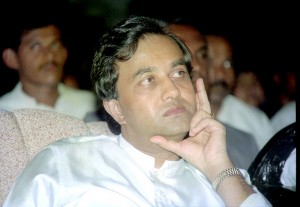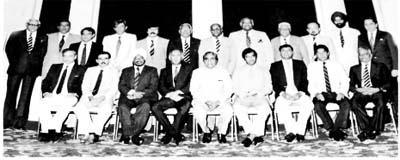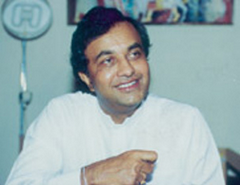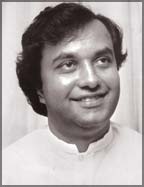 Lionel Gamini Dissanayake was born in Kandy as the eldest son of a family of seven children to Andrew Dissanayake who served as a MP and a deputy minister in the Sri Lanka Freedom Party government of S.W.R.D Bandaranaike. His mother,Welegedara Samaratunga Kumarihamy of Kotmale. Born and bred in Kotmale, his basic values were cultivated in this rural milieu social surrounding and environment. The wealthy Dissanayake family resided in both Kandy as well as Nuwara Eliya. Gamini Dissanayake had his schooling at the prestigious Trinity College in Kandy, and received his tertiary education at the Sri Lanka Law College. Later in life, he completed an MPhil Degree in International Relations at Cambridge University UK.
Lionel Gamini Dissanayake was born in Kandy as the eldest son of a family of seven children to Andrew Dissanayake who served as a MP and a deputy minister in the Sri Lanka Freedom Party government of S.W.R.D Bandaranaike. His mother,Welegedara Samaratunga Kumarihamy of Kotmale. Born and bred in Kotmale, his basic values were cultivated in this rural milieu social surrounding and environment. The wealthy Dissanayake family resided in both Kandy as well as Nuwara Eliya. Gamini Dissanayake had his schooling at the prestigious Trinity College in Kandy, and received his tertiary education at the Sri Lanka Law College. Later in life, he completed an MPhil Degree in International Relations at Cambridge University UK.
Gamini Dissanayake was undisputedly a shining light in the political firmament of 20th Century Sri Lanka. Charismatic, erudite and honourable he was one politician who early in his career amply demonstrated that he had all the qualities required to give true statesmanlike leadership to Sri Lanka.
In the way he handled things, there was dignity and finesse. The accelerated Mahaweli development programme which he set about with supreme confidence primarily because he was personally able to win the trust of Britain the donor country with his impeccable English, admirable diplomatic skills and overpowering personality, will always remain a lasting monument to his memory. The address he made to the International Cricket Council at Lords that clinched Test Status for Sri Lanka still resonates among the cricketing elite in the world. The charisma that Gamini possessed is difficult to describe. He definitely had something more than most of his contemporaries including stalwarts like R. Premadasa and Lalith Athulathmudali. Even in the midst of world leaders like Reagan, Thatcher or Indira Gandhi the graceful figure of Gamini stood out.
Gamini Dissanyake spearheaded the Mahaweli Development Project. This was a huge project which was expected to take 30 years to finish. But due to Gamini Dissanayake’s skills he managed to finish the project within 6 years. The Mahaweli Development Project is the largest development project conducted in Sri Lanka after independence. The whole country was affected by the project which focused on irrigation, hydro power generation, agriculture, town and country development. Majority of the power generated for the local consumption is generated from these hydro-power plants while an overwhelming majority of the rice cultivation in Sri Lanka is conducted in these Mahaweli areas. He was elected President of the Board of Control for Cricket in Sri Lanka in 1981. He helped to build new cricket pavilions at Asgiriya in Kandy and Matara. He canvassed in Britain and secured Sri Lanka’s place in the world community of Test Cricket. To achieve this goal he had to assure the International Cricket Council that Sri Lanka would improve its cricket infrastructure. He was able to successfully achieve this and under his presidency. Sri Lanka achieved Test Status for Cricket in 1982. Under his guidance the Sri Lanka Cricket Foundation was formed and he was the first Chairman of the Board of Trustees.
 Gamini Dissanayake was also the former Sri Lanka Cricket (SLC) president and was among the former presidents of the Asian Cricket Council (ACC) who received life time awards for their contribution to cricket at the ACC’s 25-year celebrations banquet.
Gamini Dissanayake was also the former Sri Lanka Cricket (SLC) president and was among the former presidents of the Asian Cricket Council (ACC) who received life time awards for their contribution to cricket at the ACC’s 25-year celebrations banquet.
 After President D.B. Wijetunga indicated he would not run in the 1994 presidential election, Dissanayake was nominated as the UNP candidate at the same time he was the Leader of the Opposition in parliament. This was cut short when he was assassinated by a female suicide bomber of the Liberation Tigers of Tamil Eelam (LTTE). His wife Srima Dissanayake ran in his stead, but was defeated by People’s Alliance candidate and then Prime Minister Chandrika Kumaratunga.
After President D.B. Wijetunga indicated he would not run in the 1994 presidential election, Dissanayake was nominated as the UNP candidate at the same time he was the Leader of the Opposition in parliament. This was cut short when he was assassinated by a female suicide bomber of the Liberation Tigers of Tamil Eelam (LTTE). His wife Srima Dissanayake ran in his stead, but was defeated by People’s Alliance candidate and then Prime Minister Chandrika Kumaratunga.
Of all the assassinations that took away the lives of leaders in this country, the assassination of Gamini Dissanayake will rank as the blow that hit this nation the hardest. He was truly a symbol of hope. It is indeed unfortunate that he did not live to lead this country even for a short time. For nearly eighteen years after the cruel assassination of this great son of Lanka, a grateful nation has held him in the highest esteem.
Article Prepared by: Harshana Seneviratne
Edited by: Nuwan Kamaragoda
Sources: Lanka Page, Wikipedia
Related Posts:
Published 13 years ago







